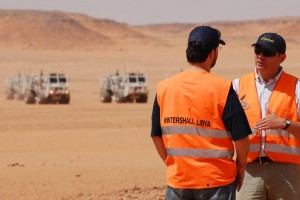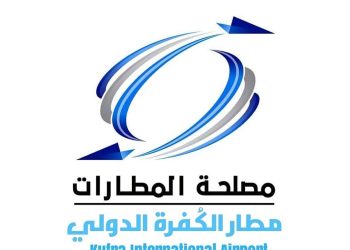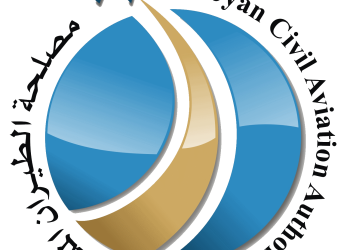By Nigel Ash.

Kassel, 12 March 2013:
Significant production increases in Libya contributed to record earnings for German oil and gas company Wintershall, . . .[restrict]the firms CEO Dr Rainer Seele said today.
Announcing a boost in post-tax earnings of almost 13 percent to €1.2 billion, Seele told a press conference in Kassel where the firm is headquartered, that there had been an higher than expected growth in daily Libyan production. By the end of 2012, output had stabilised at around 85,000 b/d, and averaged over the year 83,000 b/d.
“There may still be certain fluctuations in our oil production” explained Seele, “because it depends on the availability of export infrastructure in the country. But fortunately, we were able to secure additional capacities in export pipelines in the past year.”
Before the revolution, Wintershall was lifting around 100,000 b/d from Libya. The company locked down production at the start of the revolution. According to one of its Libyan employees who were all kept on the payroll, “ the company went the extra mile to ensure that its local people were looked after during the fighting.” Wintershall was also the first foreign oil company to return to Libya after the revolution.
To overcome a bottleneck caused by degraded pipeline infrastructure, the German firm financed and project-managed the construction of a new 52 kilometre pipeline, linking its concession in block C96 with the Amal field, from where oil is transported to the export terminals at Ras Lanouf. This remains the largest civil engineering project yet undertaken in the Libya since the revolution.
Working with NOC subsidiary AGOCO (Arabian Gulf Oil Company), the project was completed in record time and within budget. The original budget was €31.5 million, but it is understood the cost came in at €27 million. Martin Bachmann, Wintershall’s board director responsible for Exploration and Production told the Libya Herald today: “Wintershall is in a unique position among foreign oil companies because its concessions predate the third and fourth licensing round.”
It therefore does not need to renegotiate some of the most challenging worldwide terms which include an 88 percent production sharing agreements with the NOC.
Wintershall, said Bachman, had completed its exploration programme in Kufra, and like other oilcos that were directed to the region by the Qaddafi regime, had no further plans to return there. Wintershall’s main production areas, he said were in blocks C96/97. “We are producing under a concession which requires no renegotiation and we are not seeking any renegotiation.”
Of the new pipeline construction, Bachmann said : “What we wanted to do was make a pragmatic and unbureaucratic contribution to the reconstruction of the country. We believed that as an oil company, one of the things where we can contribute is to help it actually produce and sell on the international market as much oil and gas as possible. That was why we tried to solve the [pipeline] bottleneck, which of course affected us as well. It was an old and corroded pipeline. We said look, let’s do a pretty pragmatic solution here. We were in the country before the other operators and contractors and we said, we will build the pipeline for you, we will mobilise the contract for you, so we will project manage the whole thing.
“We had never project-managed a pipeline before in Libya. Typically in Libya the NOC will build the pipeline. We said, look, we at Wintershall we build pipelines around the world. We can do this for you very quickly. And we did.
“We are treating [the cost] like a loan that is going to be paid back over a number of years. In my view, it is a sign of the new Libya. Part of the agreement was that there was a steering committee which included NOC and we got decisions made in this committee very quickly.”
Of the security situation, Bachmann said: “I think we will see a fairly long period of unsettled conditions and uncertainty in the country, which needs to find its way. At the moment there is no constitution which has general acceptance in the country. At the same time there is clearly a lack of security structure in the country. I am talking about a police force. I am talking about a regular controlled army, which are both lacking at the moment. In that sort of system, any sort of tribal animosity has always the potential to flair up locally.”
“But what I think we are very clearly seeing in the country is that there is a very significant and substantial will by the population at large to come to a united and shared understanding of what Libya should be. It will take some time and it is not surprising after such along period of dictatorship with no democratic institutions . I think that this will contribute to the uncertainty for some time to come”. [/restrict]








